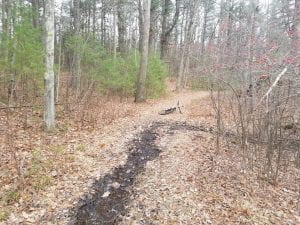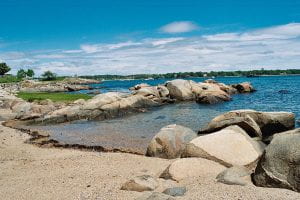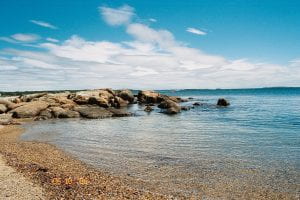I grew up in a fairly rural area of Massachusetts, and for me, wildness was all around me. I spent much time outdoors when I was young, and spending time with my siblings and neighborhood friends, who are some of my best friends today. When home, we would walk through the woods in our backyard, along the trails and even on highway overpasses where they would lead. This picture below is an image of a trail in the Georgetown-Rowley State forest that lies behind the home I grew up in.

Source: John Peterson, google.com
This space holds many great memories for me, so I felt it worth mentioning. But it became abundantly clear to me, though, when I read Barbara Kingslover’s Knowing Our Place, what space in the world I would be writing about this week. This passage sincerely resonated with me, and confirmed that I had the right place in mind:
People will need wild places…They need to experience a landscape that is timeless…To be surrounded by a…commotion of other species…none of whom could possibly care less about your economic status or your day-running calendar…It reminds us that our plans are small and somewhat absurd.

My version of Kingslover’s landscape is a small beach in Salem, MA where I spent most of my childhood with my family and brought many friends, who all fell in love with it (almost) as much as I did. My mother grew up in the neighborhood where this beach was located, and my grandparents owned that home until I was in my 30s. To this day, it holds a special place in my heart. As kids, we would spend time looking for and capturing any number of sea life and objects we could find. Anything from sea glass and old shells, to mussels, hermit crabs, and barnacles would provide us endless entertainment.
As I got older, it became less about the simple fun of splashing around and collecting old glass, and more about a place to relax, center myself, and reflect. I firmly believe we need this time away from our regular lives to reset ourselves and quiet our minds. We need the reminder that our world is bigger than just us, as we can tend to get us caught up in fast-paced lives and the urgency of everything that is happening right in front of us. But what I did notice as I got older, is that it wasn’t taken care of as well as I remember in my youth.

In her piece entitled Home Work, Tempest Williams talks of legislative action taken on Western land, as it is becoming increasingly used, bought, and sold as if it is something to be owned; something she refers to as ‘the civil war’. Should we regulate wilderness? If not, she is concerned, it could become overused and ruined; but if we do, it might not be able to be enjoyed by the very people that love the land the most. She states: “…This is not hard to understand: falling in love with a place, being in love with a place, wanting to care for a place, and see it remain intact as a wild piece of planet.”
This quote resonated with me because it made me think of my own “place” and how much I love it. I care about it because it is part of my childhood identity. When I saw the care of it going downhill, it really made me sad. It used to have crystal clean water and, each year, a comb-through to remove debris and brin in new sand. Now the water is oily with gasoline, and new sand simply dumped over the old; so much so that the high sand causes the beach to meet the street, when before, the high wall it is packed up against would safely shield a child from the sun while enjoying some ice cream. Without access to a clean, functioning beach, how will children in future generations enjoy the simple pleasure of a day at the beach, learn about sea life or reflect on their connection to this space and the world around them as they grow older?

The readings from Williams and Kingslover stress the importance of nature, connecting to it, and respecting it. It should be enjoyed and appreciated, while still preserving it for generations to come. Williams perfectly encapsulates the concept of needing nature in our lives in Home Work, and how pertinent it is to connect to the wildness of it when she states: “It’s hard to take yourself very seriously when confronted face-to-face with a mountain lion or the reality of no water in the desert…stars no longer seen by most as they are erased by urban life.”
Photos are my own, unless otherwise credited.

Hey Amanda,
The beach is one place that I also find very important and loved growing up. As we’ve all gotten older, I’m sure we’ve noticed that our childhood favorite places in nature are not the same anymore. I spent the majority of my life growing up in the Carolina’s where the beach is literally called “dirty Myrtle”. The water is not clear, the beaches are so polluted, and the general environment isn’t what it used to be.
This got me thinking about the reasons why our beaches have become so polluted in the past 15 years. Have the majority stopped caring? Does urbanization have a bigger impact than we thought? I found an article from the EPA about the condition of beach health and what some of these causes are for its downfall. I hope we can be part of the change to reverse some of this damage and preserve the places we saw growing up.
https://www.epa.gov/beaches/learn-what-affects-beach-health#:~:text=Accidental%20or%20intentional%20discharges%20from,water%20from%20sinks%20and%20showers.
Hi Amanda,
What part of Massachusetts did you grow up in? Is that your bike in the picture? Is Salem where you grew up or was that a different spot? I lived in Amherst, Sunderland, and Ware during and after attending college. Your background sounds very similar to mine. My best friend that I have today grew up playing and walking around in the woods and making up games, and scenarios with the things around us since her parents didn’t have TV and we didn’t have smart phones growing up. It really made me appreciate the time that I spent with her doing those things, because being on screens got old real quick as we both got older.
I think it’s really cool that you got to grow up near a large body of water, besides a pond or stream and collect real moving, living things to gain an understanding about life that isn’t yours, but that matters. The places that we come back to, can tend to serve us differently over the years, but still remain just as important, and I think that, that’s such a rare gift to have in life. You don’t really find or get that anywhere else. I am glad that you still take advantage of your special place to this day! I’m sorry that the nature of the place where you go back to has changed! It’s super disheartening to see that happen over time, and worry about what the younger will or will not do about it.
I liked how fresh, and truthful Barbara Kingsolver was in her last paragraph where she said “It reminds us that our plans are small and somewhat absurd.” It made me think about how no matter what we do, we always need a place to do it ON. If we don’t have a planet, how can we save it? How can we think about going forward with what we want to do? She puts things into a good perspective, but not in a harsh way, but more of a nudging way, to hint at all of us, that life isn’t always going to just be about us!
Hi Amanda – as someone relatively new to Massachusetts (I have only lived her for two and a half years), I find the juxtaposition of the woods and water to be breath-taking. There are a lot of varied landscapes (including the cranberry bogs!) in a relatively small geographic area, and I think that is creates something special. I lived in Vancouver, BC, Canada for a few years and it was mind-blowing that within a 90-minute drive one could dip their toe in the ocean water and then be standing on top of a glacier!
I appreciate you sharing your views on the importance of how the beach and water have comforted you over the years. I think it’s a great observation how you can witness the change in the way that this happens too, from frolicking as a child on the beach, to finding an escape from the everyday hustle of life, as an adult. Williams raises many great points in the article, one of which is how the person and place lend themselves to the political. As they saw in their backyard, it’s hard to preserve the beauty of nature, when others want roads to drive to or through it, need to draw from its resources, and so on. I’m saddened to hear that you think the beach is not as well-kept as it once was.
The preservation of nature is an absolute necessity, and yet, how do we do that without imposing some sort of politics over it? I know it’s no easy task, but it’s our job to keep nature as pristine as we can so that people can enjoy its beauty for hundreds and thousands of years to come. Maybe if there are enough of us who decide to take a stand and share how important nature is to us, we’ll be able to enact some change and protect our surroundings from more damage. As you share, being connected to nature allows us to realize how small we are, in comparison, and how we are all connected.
Williams, Terry Tempest. Red: Passion and Patience in the Desert. Vintage, 2002.